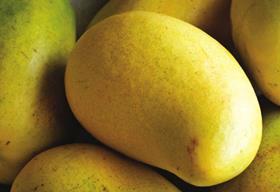
An unusually early start to the Mexican mango season – almost one month earlier than last year – has not yielded the results that suppliers had hoped for, according to the International Mango Organisation (IMO).
USDA data has shown that prices are averaging US$2 per carton less than last year; with levels dropping steadily on a week-by-week basis.
For the week of 12 February, IMO said prices were recorded at US$7-11/carton in Texas before falling to US$6.50-10/carton in the week of 19 February.
The following week, volume picked up with arrivals entering the US through both the Arizona and Texas points of entry.
Prices in Texas held stronger in the US$5-8/carton range, according to IMO, while Arizona-based distributors competed with heavy South American volume and sold in the US$4-7/carton range.
By the week of 5 March, prices edged up slightly into the US$5.50-8/carton range in Texas compared with US$4-8/carton in Arizona which IMO said probably reflects lighter availability of larger fruit on the West Coast.
The following week of 12 March prices fell back into the US$5-8/carton range in Texas versus US$4-7/carton on the West Coast which had across the board availability on all sizes.
This current week IMO said it is seeing prices begin to level off in the US$5.50-7.50/carton range for Texas crossings versus US$4-7.50/carton on the West Coast, where the upturn in volume may reflect slightly less larger fruit.
At the same point last year, mangoes were selling in the US$6-13/carton range given that the Texas crossings began in early March and West Coast arrivals did not start until the end of March compared with the early February start this season.
There have also been some reports of rejections on Mexican fruit, according to IMO, which it claimed may be attributed to shippers who “jumped the gun”.
Crop-wise, the IMO said reports of damage from the frosts this winter have been “greatly exaggerated”.
According to IMO data based on information from experts in Mexico, the country is set for a normal mango season which will probably result in another bumper crop.
The Ataulfo mango is a much smaller-sized fruit (counts 12-24) than the conventional varieties (counts 8-14 for Kent, Tommy and Haden) meaning a premium is paid for larger fruit.
Conventional mango varieties (Kent, Haden & Tommy) are currently selling in the US$3-4/carton range on all sizes, according to IMO, with plenty of volume available as supplies from Mexico, Guatemala and Nicaragua converge on the US and Canada markets.



